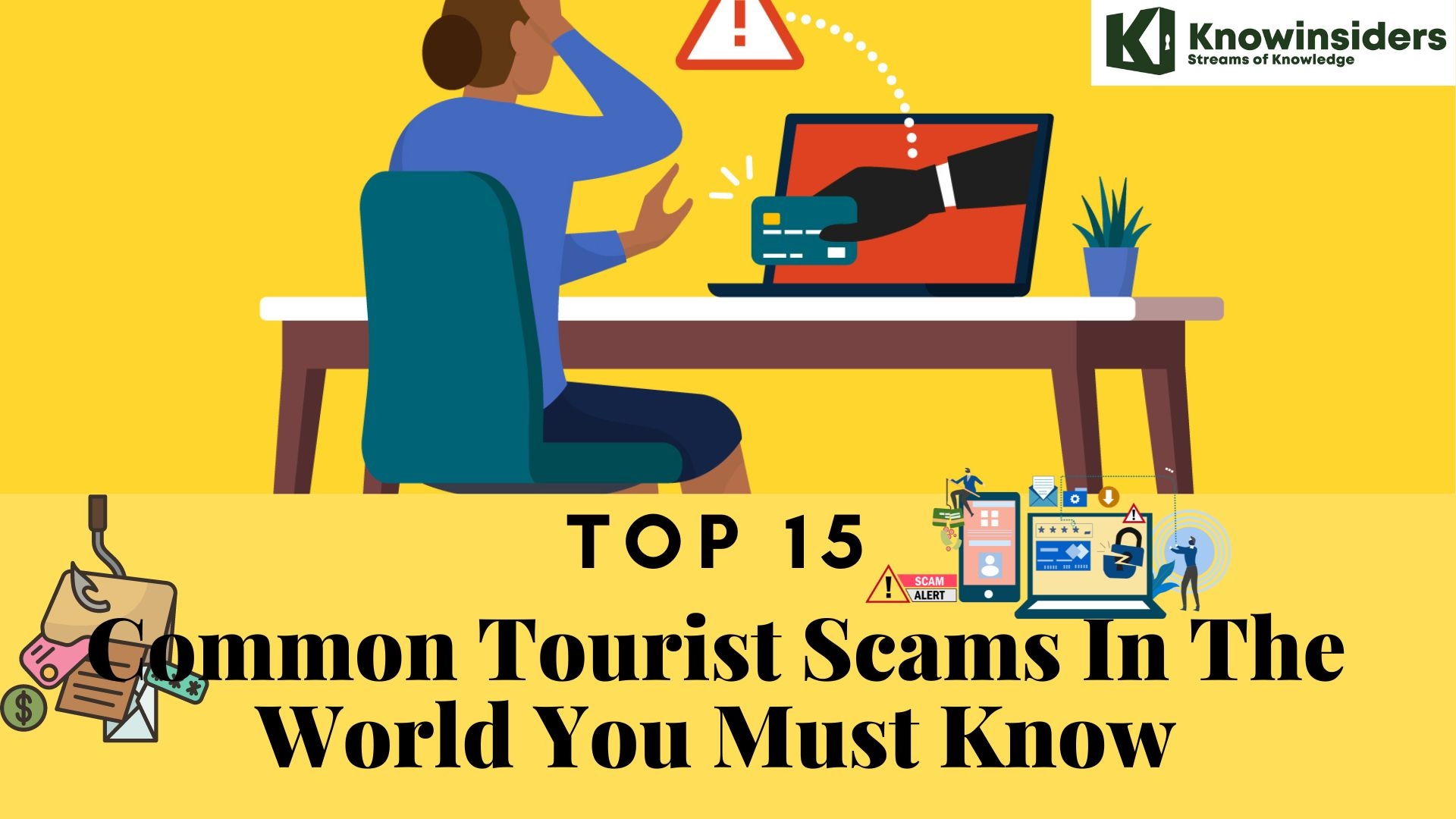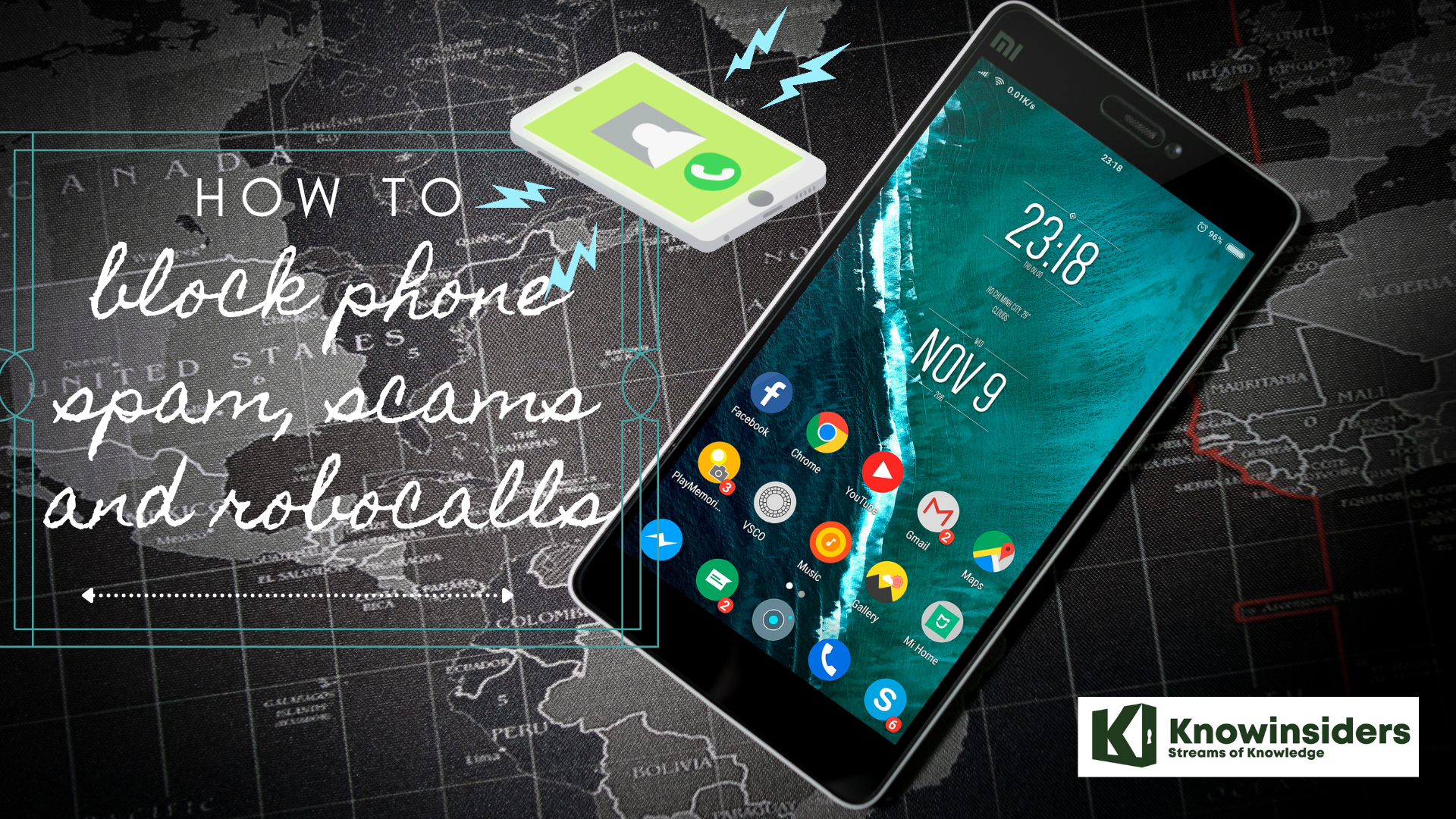Top 15 Common Tourist Scams In The World Today
 |
| Top 15 Common Tourist Scams In The World You Must Know Knowinsiders.com |
| Table Of Content |
Travelers are often seen as an easy target by thieves, pickpockets, and scam artists. Travel fraud is a real threat. We might like to think that only naive, trusting tourists can get duped. But as scam artists get craftier, even seasoned travelers can fall for a trick.
When traveling abroad, it's not uncommon to get caught in a scammer's game — even if you consider yourself to be a relatively savvy traveler. However, knowing the usual traps scammers set for tourists at your destination can help you prepare and be on guard.
Take a look at these top 15 common tourist scams around the world and how to avoid them whenever you travel to.
What are the Common Types of Travel Scams Today?
 |
| Photo: Getty Images |
1. Charity scams
A charity scam is when a thief poses as a real charity or makes up the name of a charity that sounds real in order to get money from you. These kinds of scams often increase during the holiday season as well as around natural disasters and emergencies, such as storms, wildfires, or earthquakes. Be careful when any charity calls to ask for donations, especially ones that suggest they’re following up on a donation pledge you don’t remember making.
2. Debt collection scams
Most debt collectors will contact you to collect on legitimate debts you owe. But there are scammers who pose as debt collectors to get you to pay for debts you don't owe or ones you’ve already been paid.
In most cases, a legitimate debt collector will provide you with information about the debt during or shortly after the first communication. This information may arrive as a letter often called the “validation notice.” If you don’t receive this information, you can ask for it. If you do receive this information and don’t recognize the debt or have questions, you can dispute the debt. And if a debt collector won’t send you information about the debt, that might be a sign you are dealing with a scammer.
3. Debt collection scams that target survivors
After someone dies, scammers may check obituaries or other legal notices and contact the deceased’s relatives, posing as a debt collector. If you receive such a contact, the scammers are trying to get your personal or financial information in order to steal your money, or commit identity theft or other types of fraud.
4. Debt settlement and debt relief scams
Debt settlement or relief companies often promise to renegotiate, settle, or in some way change the terms of a person's debt to a creditor or debt collector. Dealing with debt settlement companies, though, can be risky and could leave you even further in debt.
5. Foreclosure relief or mortgage loan modification scams
Foreclosure relief or mortgage loan modification scams are schemes to take your money or your house, often by making a false promise of saving you from foreclosure. Scammers may ask you to pay upfront fees for their service, guarantee a loan modification, sign over the title of your property, or sign paperwork you don’t understand.
6. Grandparent scams
If you get a call from someone who sounds like a grandchild or relative asking you to wire or transfer money or send gift cards to help them out of trouble, it could be a scam.
7. Imposter scams
Imposter scammers try to convince you to send money by pretending to be someone you know or trust like a sheriff, local, state, or federal government employee, or charity organization.
8. Lottery or prize scams
In a lottery or prize scam, the scammers may call or email to tell you that you’ve won a prize through a lottery or sweepstakes and then ask you to make an upfront payment for fees and taxes. In some cases, they may claim to be from a federal government agency.
9. Romance scams
A romance scam is when a new love interest tricks you into falling for them when they really just want your money. Romance scams start in a few different ways, usually online. Scammers may also spend time getting to know you and developing trust before asking you for a loan or for access to your finances.
Travelers Fall Victims to Scammers
 |
| Photo: Services Australia |
Travelers are often seen as an easy target by thieves, pickpockets, and scam artists. Travel fraud is a real threat. We might like to think that only naive, trusting tourists can get duped. But as scam artists get craftier, even seasoned travelers can fall for a trick.
Tourist scams happen all over the world. A healthy sense of caution can go a long way, but you can't always predict when things will go awry. It's important to know what kind of cons exist so you can safely navigate situations as they arise.
 15 Pocket Tips to Avoid Tourist Scams in Europe Today 15 Pocket Tips to Avoid Tourist Scams in Europe Today Scams are everywhere, and you need to be careful whenever you want to travel anywhere. These useful and helpful tips will help you avoid tourist ... |
Top 15 Most Common Tourist Scams in the World Today
1. Taxi scams
Before hailing a taxi, travelers should be aware of the many taxi driver scams they may encounter. Most frequent are the stories about cab drivers who claim the meter is broken and charge a wild rate or meters that run fast and rack up a huge fare. Drivers who hang around airports and hotels are known to overcharge, but it can happen anywhere.
Before getting into a taxi, ask the hotel staff what you should expect to pay for a ride. When getting into the car, ask the driver to turn on the meter first thing to avoid being overcharged. Make sure to only ride in authorized cabs and stay vigilant for red flags that indicate it may be an unlicensed cab trying to dupe tourists.
Also, be wary if your driver tries to tell you that your hotel is overbooked or closed. The driver will then try to take you to a different, more expensive option, where they make a nice commission for dropping you off. This also poses personal safety concerns, as you wind up in a different part of town than you expected. Do not let the driver bring you to the alternate location and insist on going to your original destination.
Fortunately, smartphones and the internet enable travelers to make smarter decisions regarding transportation. Something as simple as pulling up the directions on your phone and guiding your taxi driver can help ensure you keep your trip on track. If you are visiting a location with poor cell reception, preload the maps to your destinations before you leave your hotel for the day.
2. Ticket scams
Ticket scams can come in a variety of forms, but the most popular to look out for include:
- You purchased a ticket that's invalid, and it doesn't work at the venue.
- You paid for a ticket, but it was never sent to you.
- You paid for a certain type of ticket but received a different one.
- You purchased fast lane passes that are no longer usable by the time you get to the venue.
If any of these scams sound familiar to you, then it's time to take action. No one deserves to lose hundreds of dollars in concert ticket scams without getting their money back.
Steps for solving your issue can vary depending on what you want to do following the scam. For instance, if the scam was in person, it's recommended that you file a police report. This will require you to go to your local police department, discuss the incident in as much detail as possible, and fill out a form.
Another action you may want to consider is initiating a chargeback. This will require you to contact your credit card company or bank (whichever was used in the ticket scam transaction) to file a dispute and request a refund. Filing a dispute can sometimes be as easy as clicking a button on your app. However, you are, more often than not, directed to customer service via phone if you want to see your refund any time soon.
You may also want to send a demand letter to the merchant involved with the scam. This will require knowing who to send the letter to, where to send it, and what to say. This process can be the most complex to take on, but DoNotPay can easily take care of it on your behalf.
3. Police Officer Impersonators
The fake police officer scam is prevalent in many large cities. Tourists often don’t know the customs and are willing to comply with thieves in uniform. The phony officers may explain that there has been a problem with counterfeit bills circulating in the area, or try to ticket you for a made-up infraction. The officers will then insist that you hand over your passport and wallet.
Never give anyone your personal belongings. Request to see proper identification, and insist on handling this matter at the local police station.
Fake cops appear to be everywhere around the world and travelers will often be scammed by these faux authorities to make a quick buck. Most of the time their modus operandi is to ask you for your personal ID and then issue you a fine for no good reason, indicating that it can be paid on the spot or asking for a bribe to get your ID back. Because you don't want to get into trouble you naturally pay up. Sometimes they are uniformed, other times they are plain clothed.
Real police may ask you for your personal ID but they will never ask you to pay the fine on the spot. If you are approached by someone looking official, show them your ID but never give it to them. Ask for their ID too. If they issue you with a fine, tell them you will go to the police station to deal with the matter. The fake ones will usually hightail out out of there.
4. Public Wi-fi scams
 |
| Photo: Dignited |
Having access to public Wi-Fi is usually a relief to travelers looking to get online. However, this free service can sometimes provide golden opportunities for criminals. Public places make a great cover for hackers who can easily set up malicious hotspots and steal personal data.
Poor router configuration and lack of a strong password can make public Wi-Fi hotspots vulnerable. Hackers can work unnoticed using basic, user-friendly software which is available legally, such are Wireshark and Aircrack-ng. It is a quick process to see confidential information sent from a device connected to an unsecure Wi-Fi, including passwords and credit card details. Worst of all, the victim of the crime often will not notice that their gadget has been hijacked.
According to Daniel Markuson, a Digital Privacy Expert at NordVPN, there are a few common types of attacks that can be launched on insecure public Wi-Fi networks. These include:
- Man-in-the-middle attacks: Hacker intercepts and modifies the transmission between a device and a website/service. Then, the information on the device is no longer private.
- Evil twin attack: Cybercriminal creates a fake Wi-Fi hotspot. When a device connects to this fake access point, all communication falls into the hands of the hacker.
- Malware injections: When a device is connected to an unsecured network, malicious code can slip into the device, infect it, break down the system, and give criminals access to the confidential files.
- Snooping and Sniffing: Cybercriminals use special software to see all data passing through the network and access to the victim’s online activity. This includes browsing history, login details, and sensitive information from online accounts.
Awareness of these common types of attacks is the first step in keeping your information safe. Other ways to stay safe include confirming the name of a Wi-Fi network with a staff members to ensure it is legit, avoiding visits to website requiring personal information, setting up two-factor authentication for private account logins, enabling a firewall, using a VPN, and remembering to turn off the Wi-Fi function when you're not using it. The best way to keep information secure is to completely avoid public Wi-Fi and using mobile data instead.
5. The “Stain Jacket” scam
 |
| Photo: Shutterstock |
Essentially, the method is to divert your attention away from your valuables and onto something else. The crook squirts or spills sauce on you. They then point it out, offering to help clean it off you. Meanwhile they fleece you of your wallet or their accomplice does.
Other ways pickpockets will trick you include being jostled by local kids, someone faking falling over, being wooed by a local or having a cat/baby thrown at you. The trick here is to treat anything unusually diverting as a pickpocket attempt.
Also known as “the hot dog trick,” this travel scam can occur in airports while you are stressed out and often distracted. Someone will walk by and accidentally squirt mustard on you, or spill something else, causing a stain, according to Travel+Leisure. They will then awkwardly try to help clean up the stain while an accomplice grabs your luggage or wallet and walks off with it, according to International Business Times.
To avoid falling prey to this scam, keeping your luggage safely between your feet while sitting or standing, suggested Travel+Leisure. If you’re traveling with others, place your luggage in the middle of your group rather than beside or behind you. As for your wallet, keep it in your front pocket rather than back pocket, and keep valuables out of backpack pockets, International Business Times suggested.
What are the travel scammers?The scammers use many of the same techniques con artists have used for decades. The scammers that are caught and discussed publically often do not have the technical skill with attack tools of even the worst of script kiddies, as they prefer other methods of gaining their target information. Such scammers instead use tools that are of a social engineering nature, such as phishing or pharming attacks, in order to trick their victims into willingly parting with the information that they wish to obtain. Scammers, like other criminals in general, are often largely represented in the public eye by the least skilled members of their profession. When law enforcement parades such people in front of the media after their arrests, it is easy for us to think that they are representative of the level of skill present among the entire group of people. It is good to bear in mind that the highly skilled scammer will be considerably more careful and subtle, and we may not even realize that anything has happened until after they are long gone. The goal of scammers is to separate their unwitting victims, often those that are not technically savvy, from their PII, including names, addresses, social security numbers, financial data, and other such information. Given this information scammers will seek to drain the victim’s bank accounts and run their credit cards up to the limit, often moving such funds out of the country where they cannot be recovered easily. The motivations of scammers are almost universally financial in nature. Scammers exist to, in one fashion or another, separate their victims from whatever items of value that they might have. This might mean actual currency, information, physical objects, or any number of other means of storing value. |
6. Free Friendship Bracelet
Particularly common in major marketplaces and touristy areas across Europe, vendors target tourists (particularly women) to strike up a conversation or even aggressively ask for help with a demonstration. The vendor then proceeds to quickly braid a friendship bracelet on you, hand you a sprig of rosemary, or adorn you with necklaces. Before you have a chance to remove and give back the item, the vendor will loudly demand a hefty premium for the item. Polite tourists often want to avoid causing a scene and feel obliged to pay.
Don’t let anyone put anything on you. This will not only help avoid the hassle of dealing with a pushy vendor, but this interaction may be a set up for theft. If you are preoccupied with the vendor, their accomplice has time to swipe any easily accessible valuables.
7. Travel Voucher Fraud
 |
| Photo: National Cyber Security Authority |
While travel vouchers are a great option for travelers whose plans were unexpectedly canceled, this new normal is also proving to be a popular option for scammers and criminals to take advantage of.
Exercising skepticism is one of the most powerful tools travelers have for the protection of their vouchers. Anything that seems unusual, unprofessional, or too good to be true probably is, and when in doubt always contact your travel supplier directly.
Use caution when sharing sensitive voucher information and take care not to share it with an unverified source. If you need to contact your travel supplier with a question or request regarding your voucher, be sure you know who you are calling. Scammers have been reported to create fake online sites or listings for a travel supplier, guiding customers to contact this fake phone number or email address directly. If a victim provides their private voucher and contact information, the criminal can steal the information they have collected verbally and drain the voucher of its value.
If purchasing a new voucher, travelers are again advised to remain vigilant - pay attention to the details of the wording, research the reputation of the company selling it, and read the fine print. Grammatical errors are a red flag in official documents like a voucher. If purchasing online, the mere presence of a logo does not mean that the business is an authorized reseller of travel products and should always be verified before purchasing.
Beware of any deals that seem too good to be true. One reported scam involves criminals purchasing vouchers using stolen credit cards and quickly reselling them. Once the travel supplier catches on and cancels the transaction, the victim who purchased the voucher is left with a worthless paper. Using a credit card, as opposed to a debit card, is a great way to protect yourself from this as credit cards often offer enhanced security and fraud protection.
8. Money Changing
The good old note switch-a-roo happens everywhere. The shop keeper or taxi driver gives you less change than you are supposed to get. Or they will quickly switch a 50 for a 5 and then claim you haven't given them enough. You approach the foreign exchange booth and ask to change money. During the changeover, the clerk switches similar notes and you end up with less than you paid for.
Make sure you check your money before you leave and don't let them rush you during the process. It's vital that you keep your eyes peeled, as many currencies have denominations which appear similar in color and design.
Tip: Never accept torn, worn or damaged notes. They can be difficult to get rid of later.
9. The milk scam
The milk scam, popular in Cambodia, is one of the cleverer scams travel blogger Ferdinand Göetzen of WirelessVagabond.com has experienced.
“Underprivileged children come up to you and ask you if you could buy them some milk in the supermarket because they are poor and hungry," he said. "The fact that they ask for milk instead of money convinced a lot of travelers to agree. Once you buy the milk and leave, the child will run into the store and exchange the milk back for the money you paid for it. The store owners are in on the scam and usually get a cut.”
To protect yourself from this scam and similar tourist scams, politely refuse to buy anything for a child or beggar when prompted, travel website TravelFish.org recommended.
10. ATM Skimmers
 |
| Photo: Panda Security |
Having cash on hand is a preference of many travelers, and oftentimes that cash comes from an automated teller machine, or ATM. However, there is sometimes risk involved to using these convenient machines, as thieves have ways of stealing ATM card details.
ATM skimmers are small devices which criminals place inside the ATM machine slot. This device records the card information when the physical card is inserted into the machine. The PIN of the card is also needed, so there is often a camera hidden to record the PIN, or a PIN pad overlay, which is placed on top of the normal pad, recording the entered code.
Luckily, there are multiple ways for travelers to protect themselves from this type of theft. Upon arriving at the ATM, it is advised to examine the card reader, the keypad, and the privacy shield. Skimmers are often snapped into place or attached with an adhesive, so the device should be noticeable. Also, the card should go into the slot smoothly – if the card is entered into the slot and doesn’t go in easily, an external device may be installed. Lastly, when a PIN is entered, travelers should take care to cover the code with their free hand as they punch in the numbers. This will block the PIN from any camera installed, trying to record the number.
It is not an exact science, but savvy travelers may be able to protect themselves from this kind of theft by paying attention to anything that seems out of the ordinary and taking special care to shield their information when using an ATM.
11. Over-friendly Local
Male travelers may find themselves approached by amiable, flirty, locals out at bars or restaurants. They may insist on showing you the best spots around town. Travelers make a quick friend over the course of several rounds of drinks or a multi-course meal. When it’s time to settle the tab, the new local friend is nowhere to be found. Or, worse, an overly trusting tourist may be drugged and wake up to find they have been robbed.
If someone you just met is offering to show you around or is being unusually forward with you, consider it a red flag. If you do wish to grab a drink with a new friend, go to a location of your choosing, and do not drink to a point where your bar tab will shock you.
12. The 'found a ring' scam
The “found a ring” scam is an old trick that's especially common in Paris, according to TravelScams.org. As tourists are walking along, they’ll be approached by someone — sometimes a person dressed as a tourist — seemingly friendly enough. The person will point to a ring on the ground and ask if it’s yours. Then they try to give it to you and convince you to pay them for it, reported RickSteves.com.
To avoid this tourist scam, continue walking when approached and be vigilant with whom you choose to interact.
This scheme starts with someone stoping you with a ring, asking if you have just dropped the item. After further examination, they notice that the ring is valuable and offers to sell it to you for a low price. You can resell the item later for way more than you got it for, a seemingly win-win deal. When you finally appraise the jewelry, it is proven to be a fake!
Similarly to the bracelet scam, tourists are advised to keep your head down and keep on walking if you suspect that something isn't right.
13. Juice Jacking
As travelers, we are dependent upon our mobile devices for almost everything – communication, information, entertainment - the list goes on. But our devices rely on a power source and travelers are often scrambling to plug in whenever the dreaded low battery is indicated. But don’t plug into that public charging station just yet – "juice jacking" is a new concern for travelers to be aware of.
Juice jacking occurs when a criminal tampers with a USB charging port, or the cable attached to it, so that it installs malware on a device that is plugged into it. This malware may lock the device or send data, passwords, or even a full backup of the phone directly to the scammer.
As of 2019, only a few cases have been reported, all occurring on the east coast. However, the technology has been proven and juice jacking may become a bigger problem in the future.
To be on the safe side, it is recommended to plug directly into an AC power outlet instead of a charging station, and to take your cables with you. External batteries are also great alternatives, and also allow the user to roam free rather than be tethered to the power station while their phone charges.
14. The shoe shiner
The shoe shiner scam is common in Istanbul, according to the Huffington Post. It goes like this: A man will walk by and drop his shoe brush somewhere near you. You’ll do the nice thing and pick it up, and he’ll thank you by shining your shoes. It might seem like an innocent enough gesture, but then the shoe shiner will likely demand payment — for a service you never asked for in the first place. If you refuse, you might find yourself surrounded by a crowd of shoe-shiners, reported TravelScams.org.
To avoid this, simply don’t pick up the brush, or if you already have, be assertive and say “no, thank you,” immediately if the scam artist attempts to shine your shoes.
15. Wrong Change
For those wary of identity theft or having their credit cards compromised, paying with cash may seem like a safe option. But even cash payments will have their challenges. Be careful breaking large bills on small tabs, especially in countries where all of the currency looks similar. It is common for scam artists to sneak in some lesser value bills.
If you do need to use a large bill, make sure you say out loud how much you have paid, so it is clear you are expecting change back. Even if your cashier says the correct amount of change, they may be trying to pull a fast one on you. Travelers should familiarize themselves with the currency used at their destination, and always count their change.
 Best Ways To Stop Phone Spam, Scams and Robocalls Best Ways To Stop Phone Spam, Scams and Robocalls Spam and scam calls can be annoying and sometimes even dangerous, and you want to block them forever. Then, this article is right for you. ... |
 Squid Game Cryptocurrency: Signs of A Big Scam Squid Game Cryptocurrency: Signs of A Big Scam ‘Squid Game’ cryptocurrency (token) is up more than 86,000% in a first week. Some researchers, however, warn 'Scam'! Fact-Check right now. |
 15 Pocket Tips to Avoid Tourist Scams in Europe Today 15 Pocket Tips to Avoid Tourist Scams in Europe Today Scams are everywhere, and you need to be careful whenever you want to travel anywhere. These useful and helpful tips will help you avoid tourist ... |
 Top 15 Most Famous Landmarks in the US You Should Visit Top 15 Most Famous Landmarks in the US You Should Visit Don't miss these must-see iconic landmarks on your next trip to the mighty USA! What are the most famous landmarks in America to travel? |























